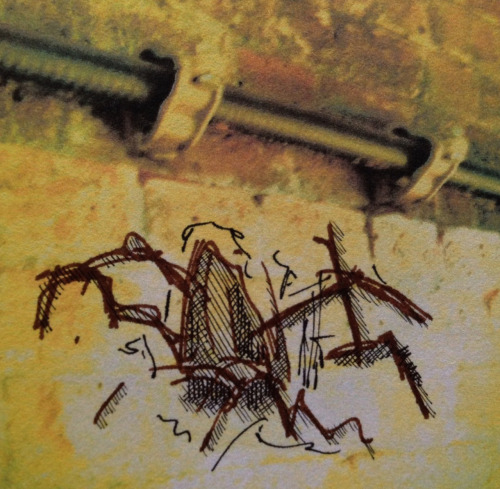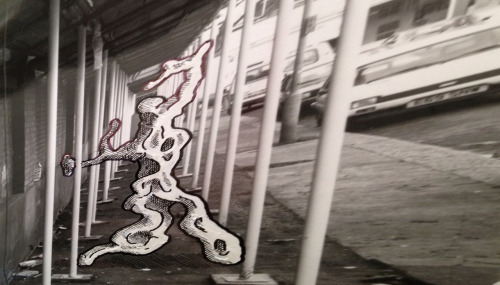Trailer - ‘The Crawl’
0:00 - 0:04
Blackness. Slow, laboured breathing extends into a death rattle.
V/O, female: ‘We lost the world.’
-
0:05 - 0:09
Series of fixed-camera shots of cities destroyed and deserted. The images intersperse with close-ups of wounds and dead flesh.
V/O: 'To the dead.’
-
0:10 - 0:13
An overgrown yard crowded with shambling, rotting corpses.
At the farthest corner of the lot, something hidden in the undergrowth snatches a zombie out of sight.
-
0:14 - 0:16
Young man (Y) runs through the charred remains of an art gallery. A mob of bloody dead run after him.
-
0:17
Blackness. Sound of wet explosion.
-
0:18
Y has turned, is staring at a swamp of decaying blood, all that is left of his pursuers.
V/O: 'We’re all prey to something.’
-
A brief history of the recent filmic ideology of the necessity of walls against zombie hordes
- 2002 - Palestine.
Construction of ‘separation fence’ aka 'West Bank Barrier’ aka Apartheid Wall begins.

……….
- 2007 - I Am Legend.
Wall provides blessed safety for refugees from snarling mayhem.
……….
- Today - Palestine
Running at the wall.

……….
- Today - World War Z
Running at the wall.
3 moments of an explosion
- The demolition is sponsored by Burger King. Everyone is used, now, to rotvertising, the spelling of company names & reproduction of hip product logos in the mottle & decay of subtly gene-tweaked decomposition - Apple paying for the breakdown of apples, the bitten-fruit sigil becoming visible on mouldy cores. Explosion marketing is new. Stuff the right nanos into squibs & missiles so the blasts of war machines inscribe BAE & Raytheon’s names in fire on the sky above the cities those companies ignite. Today we’re talking about nothing so bleak. It’s an old warehouse, too unsafe to let stand. The usual crowd gathers at the prescribed distance. The mayor hands the plunger to the kid who, courtesy of the Make-A-Wish Foundation, will at least get to do this. She beams at the cameras & presses, & up goes the bang, & down slides the old ruin to the crowd’s cheer, & above them all the dust clouds billow out Have It Your Way in soft scudding font.
- It’s a fuck of a fine art, getting that pill into you so the ridiculous tachyon-buggered MDMA kicks at just the right instant & takes you out of time. This is extreme squatting. The boisterous, love-filled crew jog through their overlapping stillness together & bundle towards the building. Three make it inside before they slip back into chronology. Theirs are big doses & they have hours - subjectively - to explore the innards of the edifice as it hangs, slumping, its floors now pitched & interrupted mid-eradication, its corridors clogged with the dust of the hesitating explosion. The three explorers have bought climbing gear, & they haul themselves up the new random slopes inside the soon-to-be-rubble, racing to outrace their own metabolisms, to reach the top floor of the shrugging building before they come down & back into time. They make it. Two of them even make it down again & out again. They console themselves over the loss of their companion by insisting to each other that it was deliberate, her last stumble, that she had been slowing on purpose, so the ecstasy would come out through her pores allowing the explosion to rise up like applause & swallow her. It would hardly be an unprecedented choice for urban melancholics such as these.
- You can’t say, you can’t tell yourself that it’s the intruder’s spirit doing any of this, that there’s a lesson here. It’s not her nor any of the other people who’ve died in its rooms, in any of the 126 years of the big hall’s existence. It’s not even the memories, wistful or otherwise, of the building. The city’s pretty used to those by now. The gusts, the thick choking wafts that fill the streets of the estate that’s built in the space the warehouse once occupied, are the ghost of the explosion itself. It is clearly wanting something. It’s clearly sad - you can tell in its angles & the slow coiling & unfolding of its self, that manifests & evanesces faster even than its material predecessor smoke did. A vicar is called: book, candle, bell. The explosion, at last, lies down. As if, though, the two drug enthusiasts who got in & out of its last moment insist, out of pity, rather than because it must.

There’s a thing about perspective, she says. He thinks he knows what she’s going to say. She surprises him though. Perspective & lists, she says. Sequences of nouns & parallel lines meeting because of nothing but increasing distance. You could almost resent it, she says, how that shit gets you. She strikes her own breastbone & shakes her head.
‘I quit because I was good, and when you’re good and a girl at something, you should be suspicious.’
'Of what?’
'Of what part of yourself you didn’t know you were selling.’
- Kirsten Kaschock, Sleight
The commodification of light & the class politics of darkness
‘You have to identify those neighbourhoods where you want to concentrate your population … We’re not going to light distressed areas like we light other areas.’
4 final Orpheuses
- Orpheus, shambling & drunk on shadows, sees sunlight & emerges into what he thinks is the world; into what with a blinking look around he decides with only a shade of uncertainty is not merely widening in the passage itself, a kind of rough natural vestibule, but must surely count as the outside. He starts to turn & honestly he supposes it does occur to him before he’s completed the movement that he’s still roofed by stone, that the fresh air really starts about three metres on. & still fractions of a second before he’s caught Eurydice’s eye, still, he would have to admit, in time to stop & walk a few steps on, he decides two things at almost the same instant. The first is that This is ambiguous, not quite tunnel nor quite outside, & that’s not fair; the second, half-predicated on the first, nervously so, is Oh I’m sure it’ll be fine.
- Orpheus, at the last, is so afraid of the light that he needs the moral support of a smile to enter it, needs it more than he needs Eurydice back.
- Orpheus can’t remember the injunction. He tells himself he can’t, anyway. He tells himself he’s turning to ask Eurydice what it was he was or wasn’t supposed to do. It’s a complicated kind of cowardice with which he looks at her.
- Orpheus has never forgiven. Never. He plans all the long way up. He slows as he approaches the threshold, listening to her ghost feet. He stops. Still just in shadow. He hisses, spins around, stares in hate & triumph at Eurydice’s shocked & receding face.
Stand down: literature has defeated the Thought Police. Belgium’s supreme court has defeated the mischief-making of the whining PC brigade. Tintin is not banned. Huzzah!
The badness of the bad faith involved in the commentariat’s discussion of this issue, the relentlessness of their categoric elisions, the unpleasantness of their crowing over the victory, should come as no surprise. This was never, at root, about banning. Yes, Bienvenue Mbutu Mondondo was applying to the court to have Tintin in the Congo declared unacceptable under the Belgian race relations law. However, he had made clear for years that he would be satisfied if, as in Britain, the book was published with a visible warning, a reminder of the context in which it was written (maybe even of the toxic ideology enshrined within). What Mondondo wanted was an official recognition that this text was a spitting in his face. That it came down to what was always clearly a nuclear option was due to the steadfast refusal of the publishers to countenance this - and thereby take responsibility for what they publish. The Belgian establishment went to cultural war, & it did so not for free speech, but for their right not to apologise for racist slander.








